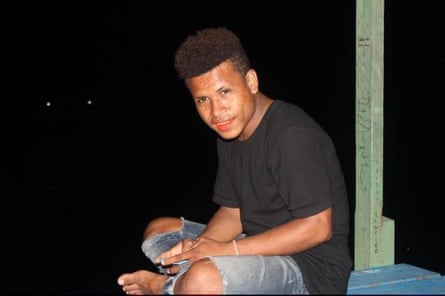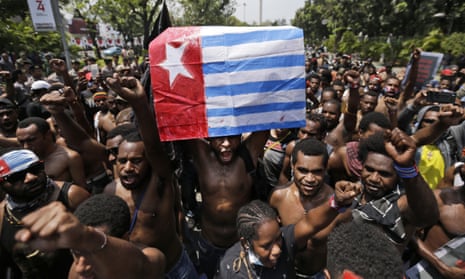Student Eden Armando Bebari, 19, was allegedly shot and killed by Indonesian security forces while fishing in his home town in West Papua in April.
Indonesian media described Bebari as a member of an armed criminal group, a claim denied by his parents. Many residents in Papua, the eastern-most province of Indonesia, now fish and tend crops to ease food shortages brought about by coronavirus lockdowns.
The Indonesian military say they are investigating Bebari’s death. But it went largely unnoticed at the time, except among friends and family. However, when protests over the killing of George Floyd while being detained by police reverberated around the globe, Bebari’s friends took action.
“I felt agitated. But I didn’t dare to speak out at that time. I was afraid. So I kept it [in],” says Benedicta Sari Vita Suwanto, 20, a classmate of Bebari’s at Multimedia Nusantara University in Banten. “There was no official condolence [at the university],” she adds.

Suwanto and her classmates tweeted about Bebari’s death, using the hashtag #PapuanLivesMatter. The tweet went viral, focusing attention throughout Indonesia to allegations of brutality by the police, military and security forces towards West Papuans.
Soon afterwards, articles, artwork, online debates and celebrity calls for action to stop the abuse were circulating on social media.
In a series of tweets, the UK-born Indonesian actor and gender-equality activist Hannah Al Rashid wrote: “I stand in solidarity with Papuan Lives Matter, because since moving to Indonesia I have observed the way in which people of darker skin have been treated unfairly, whether in the most obvious way with racial slurs, or ‘subtly’ in the way they are spoken about or represented on TV.”
Papuan photographer Whens Tebay, who has spent years documenting the struggle, posted a series of photos on Instagram to mark the moment. “We must unite under any circumstance to stand on our rights together,” he said.
Meanwhile, Indonesian artist Henri Affandi showcased his artwork, entitled Rubbish, which depicts a list of all known black Papuans who have allegedly died at the hands of police and military personnel since 1960. The artwork refers to a list of alleged abuses that was handed to the security minister Mohammad Mahfud, known as Mahfud MD, by human rights activists earlier this year. The minister said the data was rubbish.
“Aptly naming it Sampah (rubbish) … the list became a receipt that grows over time as more names from the past resurface, and senseless brutalities continue to take Papuan lives,” Affandi told the Guardian.
The #PapuanLivesMatter protests also inspired a team to create an interactive graphic, We Need To Talk About Papua, for progressive teenage art magazine, Kudeta. The graphic, which has been widely shared on social media, including by the singer Isyana Sarasvati, who has 7 million Instagram followers, contains a history of Indonesia’s colonialism in West Papua, links to petitions against police violence and a list of the names of the Papuans allegedly killed by Indonesian security forces.
“The discussion about Black Lives Matter must also be followed by an awareness that racism still occurs in our country,” says writer Bageur Al Ikhsan, part of the creative team.
West Papua is a former Dutch colony that was absorbed into Indonesia in 1969 following a controversial referendum. An existing movement agitating for independence from Dutch rule has refocused its energies on the Jakarta government, which maintains tight control over the region.
At the far east of Indonesia, West Papua remains physically and ideologically separate from the rest of the country. Indigenous Papuans make up about half of the population. Locals claim racism is rife among the police and the military, and there have been allegations of human rights abuses and exploitation against the local population. In August 2019, protests erupted in the region over alleged police abuse against ethnic Papuan students. It was the biggest protest since 1998.
A spokesman for the military declined to comment on allegations of racism and abuse by his troops. Papua police spokesman Ahmad Mustofa Kamal says “there is no racism” in his force.
Rico Tude, speaking for the Indonesian People’s Front for West Papua (FRI-WP), says the Black Lives Matter movement “gives a new understanding to the Indonesian public to be more concerned to address racism against West Papuans”.

Elvira Rumbaku, a lecturer at Cenderawasih University, agreed, adding that social media had played an essential role in bringing the issue to the fore. “It prompted Indonesians outside West Papua to understand how racist the Indonesian government is. West Papuans are always stigmatised as separatist and committed to violence; therefore, they always used security approaches and sent more troops,” she says.
Rumbaku is optimistic that more Indonesians will recognise the issue. “Hopefully this is not just a moment, but we can keep it on,” she adds.
Students at the University of Indonesia are using the attention to demand justice for Cenderawasih student executive board member Ferry Gombo, who was arrested by the Indonesian government after organising a rally against racist abuse towards Papuan students in Surabaya in August last year. Gombo, one of four students being detained in Balikpapan prison, is facing a 10-year sentence if found guilty.
Despite the outpouring of support for West Papuans, protesters still face a backlash. Another student board member at the University of Indonesia, Fajar Adi Nugroho, received anonymous threats on Saturday after organising an online debate on police violence. The university has publicly spoken out against the debate. Virtual meetings organised by Amnesty International have also been interrupted by hackers, and one of its speakers was attacked while riding her motorbike.
Suwanto says that last year students at Multimedia Nusantara University were told by administrators not to use the university name if they took part in protests.
But she adds, although it is difficult, “we don’t forget that Eden is a victim of wrongdoing by Indonesian military. We must remember Eden and the story. (Because) Black Lives Matter.”
